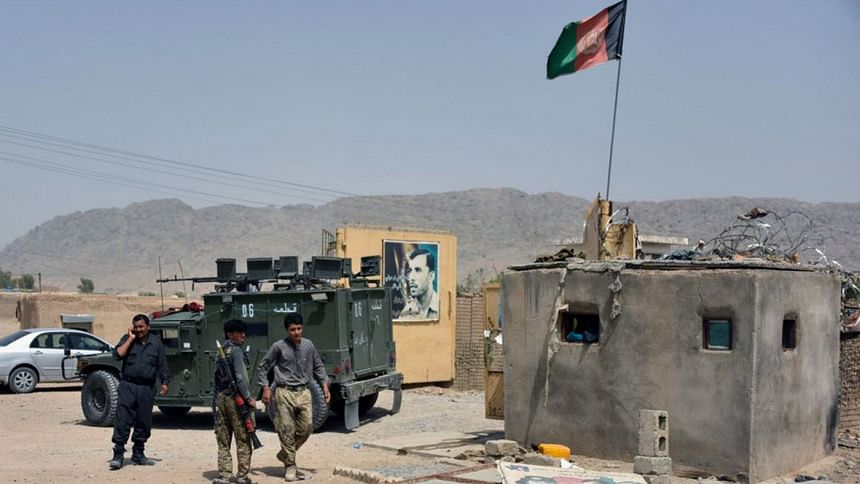The costs of abandoning the Afghan war

The 20-year war in Afghanistan has been abandoned, with the United States announcing in mid-September that it will withdraw its troops from the country. What has the US left in its wake? Leaving power in the hands of a deliberately weak government is virtually a US handover of power to the Taliban. This significant setback has once again left a "black mark" on the claim of US supremacy. The US declaration of abandonment of the Afghan war will also profoundly affect Central Asian politics, as well as the politics of Pakistan, India, and many countries in South Asia and the region. Many say China will benefit significantly from other aspects, including mineral extraction and investments in Afghanistan. However, China's biggest concern is with Uyghur Muslim rebels living in their Xinxiang province, adjacent to Afghanistan, and they fear the Taliban's presence on the Afghan border along the Wakhan Corridor could increase. A Taliban spokesman has assured them that they would not cooperate with Uyghur Muslims, but how credible is this assurance really? Russia is also concerned about the Taliban's influence in Central Asia's Turkmenistan, Kazakhstan and Uzbekistan.
According to many experts, the current situation in Afghanistan suggests that the Taliban may take the initiative to mend relations with neighbouring countries. The regime can create a new impression and get an image makeover by building a relationship with China, Russia and others. While this demands a more comprehensive analysis, there is no doubt that the politics of Central Asia will change dramatically.
From the South Asian political sphere, India supports the government of the current Afghan president Ashraf Ghani, largely due to its investments in Afghanistan. According to different estimates, several Indian businesses and companies have already invested between USD five to seven billion in Afghanistan. India has invested USD three billion in infrastructure development alone, according to The Times of India. The Afghan president has also announced his commitment to increasing India-Afghanistan bilateral trade to at least USD 10 billion. India is also using the Chabahar seaport in the southeastern part of Iran through Afghanistan to connect with Central Asia. All in all, India is worried about what will happen to these billions of dollars of investment and trade.
In this context, to protect its interests in Afghanistan, India has started a secret or back-channel negotiation with the Taliban, according to an Al Jazeera report from July 6. Indian Foreign Office officials acknowledged the allegations and said, "We are maintaining relations with all parties involved in Afghanistan. Because we want to continue India's commitment to building Afghanistan's long-term infrastructure and rebuilding the country."
Meanwhile, Pakistan is in quite a predicament. The substantial rise of the Taliban in Afghanistan has already made Pakistani militant groups happy with the withdrawal of US troops from Afghanistan. The Tehreek-e-Taliban Pakistan (TTP), Pakistan's notorious militant group born in 2006, is expected to grow stronger. The rise of the Taliban and subsequently, of TTP, can become a significant threat to Imran Khan or any government in Pakistan in the future. However, Pakistan has already said that it is possible to resolve the Afghan issue through talks. In this situation, if Imran Khan's government wants to confront the Taliban by promoting its own Islamic ideology, it will be another catastrophe for Pakistan.
Various media outlets have reported that US pressure on Pakistan will increase after its withdrawal from Afghanistan. Last month, the New York Times reported that the United States has already been trying hard to establish a military base in Pakistan. However, Pakistan is trying to reject interference from an outside power like the United States. If it agrees to the US proposal, the balance of Pakistan's foreign policy will be in jeopardy, with a huge possibility of Pakistan being targeted by the Taliban. In the last week of May, the Taliban said in a statement that it would be a "historic mistake" if Pakistan favoured a US military decision. However, Pakistan's influential daily Dawn reported on May 24, quoting Pentagon sources, that Pakistan has allowed the US military to use its airspace, and has given ground access. It is safe to say that the withdrawal of US troops from Afghanistan will impact not only India-Pakistan but the wider region, including Iran and NATO-affiliated Turkey. In particular, militants from countries in the region, including Bangladesh, may rise to prominence.
The Taliban strongly believe that the US is the defeated side in this conflict, apparent by the withdrawal of troops and the abandonment of war. Presumably, this is why the Taliban's morale is higher than ever before. In fact, they have already taken control of many areas. with very little force and resistance. To people across the world, it seems like the US did not learn from the defeat in the Vietnam War, and they have once again lost the longest-lasting war in Afghanistan by withdrawing troops. In 1969, Henry Kissinger wrote a lengthy article on the Vietnam War in the January issue of Foreign Affairs, in which he said, "We (US) fought a military war; our opponents fought a political one. We sought physical attrition; our opponents aimed for our psychological exhaustion. In the process, we lost sight of one of the cardinal maxims of guerrilla war: the guerrilla wins if he does not lose. The conventional army loses if it does not win." The ideology of the Taliban, no matter how militant or radical it is, is in line with Henry Kissinger's statement.
The United States has suffered substantial financial losses in the 20-year-long war in Afghanistan. According to the Associated Press, the US has lost more than USD two trillion in direct financial losses to Afghanistan in the 20 years to 2021. As of other estimates, the amount is USD 2.6 trillion. By 2050, the total cost of the war will be 6.5 trillion, including war veteran healthcare and various financial benefits. A total of 200,000 people have been killed in the war, including 2,448 members of the US military, ordinary Afghan civilians, US civilians at different levels, and members of the Taliban. Of these, 444 humanitarian aid workers and 72 journalists lost their lives, and 47,245 Afghan civilians were killed in the war.
After the defeat in the Vietnam War, the United States faced the questions of the people in its own country. There were protests all over the world against that war. Perhaps the same question about the Afghan war may come to the minds of US citizens. Many (not just the American people) may be wondering what it means to spend so many trillions of dollars on the loss of so many lives. In the book The Three Trillion Dollar War: The True Cost of the Iraq Conflict, the authors—Nobel prize-winning economist Joseph Stiglitz and Linda Bilmes—said, "The failure in Iraq was not the result of a single mistake but the culmination of dozens of mistakes made over a period of years." The statement may also be true about the Afghan war.
Amir Khasru is the Chief Executive, Study Group on Regional Affairs, Dhaka.
He can be reached at [email protected]

 For all latest news, follow The Daily Star's Google News channel.
For all latest news, follow The Daily Star's Google News channel. 



Comments